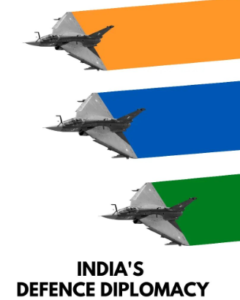
Pic Courtesy: Internet
“Diplomacy is the velvet glove that cloaks the fist of power.”
― Robin Hobb
Diplomacy. Diplomacy is the practice and skill of managing international relations between countries by the use of negotiation, dialogue, and compromise. Diplomatic efforts can address a wide range of issues, such as trade, security, human rights, climate change, etc. Diplomacy is not synonymous with foreign policy, while foreign policy sets the political goals, diplomacy is the instrument for achieving them.
“If diplomacy has any chance to work, it must be coupled with a credible military Power.”
– Author: Benjamin Netanyahu
Military Diplomacy. Military Diplomacy also known as defence diplomacy, is a term used in international relations to describe the pursuit of foreign policy objectives through the peaceful utilisation of defence resources and capabilities. It involves the employment of defence resources to achieve specific national goals. It is an important aspect of modern diplomacy and is an invaluable instrument of statecraft. It can be summarised as an oxymoron “using hard power as soft power”.
Soft Power vis-à-vis Hard Power
The terms Hard Power and Soft Power represent two important concepts in the field of International Relations.
Soft Power Soft power is the capacity to advance foreign policy objectives and priorities of a country by non-coercive means. It constitutes a wide spectrum, however, its key components include socio-cultural and civilizational aspects. It can also be defined as the ability of a state to project its influence other than through military combat. It serves as an effective diplomatic lever, influencing the decision-making process and other States’ behaviour. It is a vital instrument in foreign policy by itself or as a complement to the application of “hard power”.
Hard power. Hard power refers to the ability to change other states’ positions by force or by inducing military and economic power to coerce them into submission. Hard Power includes use of military, economic, and political means to influence other States.
Power Projection (Hard/Soft). Power projection is the capacity of a state to deploy and sustain forces outside its territory. This deployment could be for their utilisation as a hard power or as a soft power. Power projection requires political will and military expeditionary capability. Hard power utilisation would include, posturing to convey the intent of the use of military force, punitive use of force, and armed intervention. Examples of soft power projection would include humanitarian assistance and disaster relief (HADR), peacekeeping military operations and evacuations, etc.
“You can do a lot with diplomacy but of course, you can do a lot more with diplomacy backed up with firmness and force.”
—Kofi Annan
Preferred Option. Historically, hard power used to be traditionally the more sought-after option for diplomacy, with stronger countries establishing dominance over the small states. Hard power is tangible and easy to measure, and its effects are visible and even predictable to a certain degree. However, it is an immediate but short-term solution. On the other hand, soft power effects are intangible, hard to measure, and unpredictable but longer lasting. In modern times, the preferred option is both to be used as complementary to each other. The trend is to use even the hard power as a soft power and use it stand-alone only as a last resort.
Suggestions and value additions are most welcome
For regular updates, please register here
References and credits
To all the online sites and channels.
Disclaimer:
Information and data included in the blog are for educational & non-commercial purposes only and have been carefully adapted, excerpted, or edited from sources deemed reliable and accurate. All copyrighted material belongs to respective owners and is provided only for purposes of wider dissemination.

India has been using Defence Diplomacy as a tool to increase its influence among the friendly foreign countries and to achieve its foreign policy objectives. The methods and tools it has used include security partnerships with countries like United states of America, Russia, France etc, in the arena of joint military exercises, Defence cooperation agreements, and procurement .In addition , capacity building arrangements, counter terrorism cooperation, Humanitarian assistance , maritime security, strategic trust building are some of the ways India has effectively used Defence Diplomacy
Thanks
Coming up more on it.
1. Tools of military diplomacy.
2. Indian approach.
3. Way ahead.